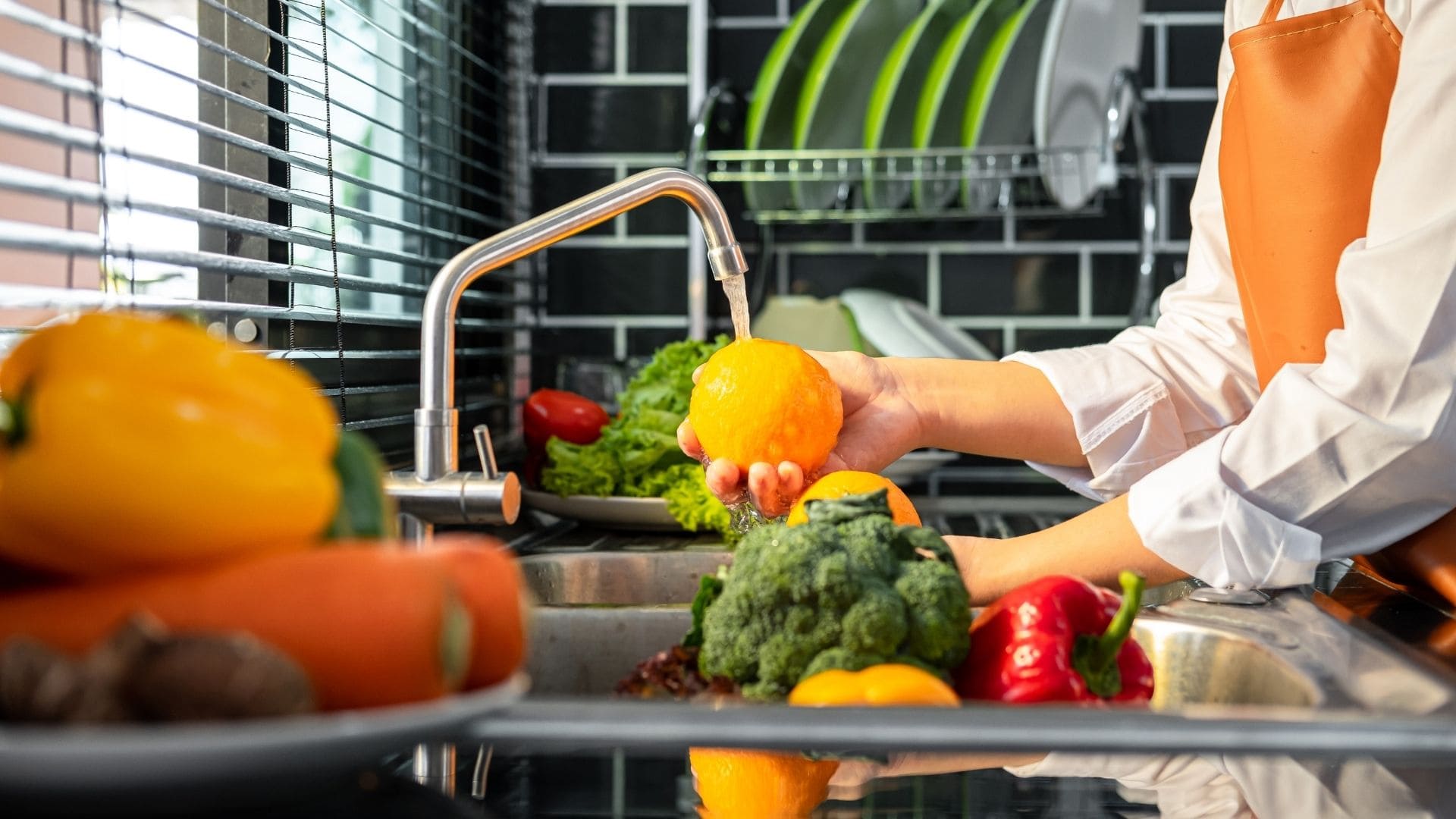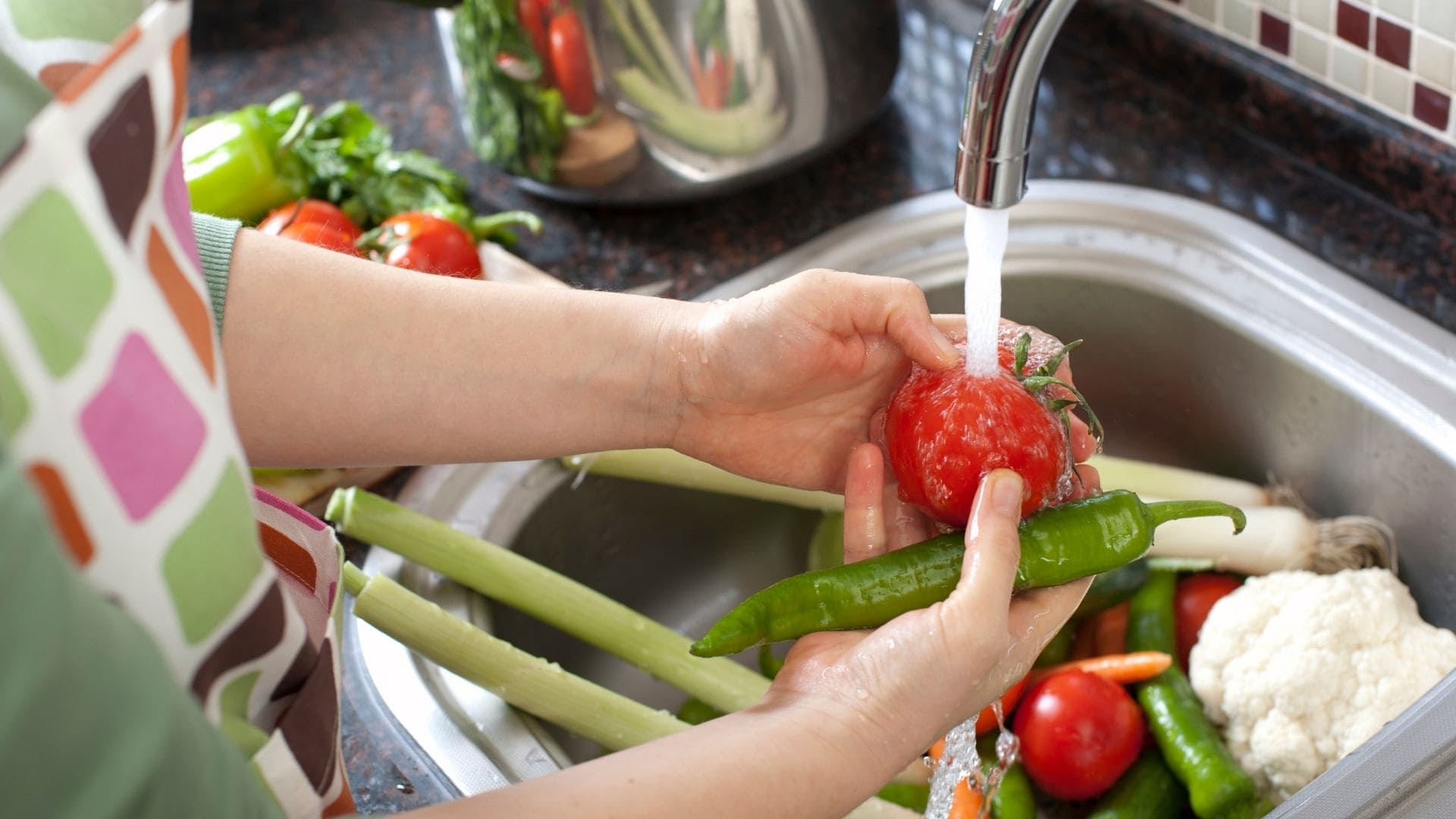At Mama Fatma, we pride ourselves on using the freshest ingredients in all of our dishes, from our signature Turkish, Middle Eastern, and Mediterranean meals to the simplest salads and sides. Located in Mississauga, Mama Fatma offers a true taste of these regions, all made with halal ingredients.
One of the most critical steps in ensuring food safety and quality in any kitchen is learning how to properly wash your vegetables and fruits. This simple process can eliminate dirt, bacteria, and pesticides, making your produce safer to eat and enhancing its flavor and texture. In this blog, we will explore the best practices for cleaning fruits and vegetables and why techniques like using vinegar and baking soda are so effective. Whether you’re preparing fresh vegetables for a side dish or crafting a refreshing fruit salad, these tips will help you serve the cleanest, healthiest food possible.
Blog Contents
ToggleBest Practices for Washing Vegetables
Washing vegetables thoroughly is essential for maintaining food safety and preventing contamination. Fresh vegetables often contain dirt, pesticide residues, and bacteria from the soil, so cleaning them properly before cooking or eating raw is vital.
Step-by-Step Guide for Washing Vegetables:
- Rinse Under Cold Running Water: The simplest and most effective method to start cleaning vegetables is to rinse them under cold running water. This helps to wash away dirt and debris. Ensure that the water flows over all sides of the vegetable.
- Use a Vegetable Brush: For vegetables with rough or firm skins like carrots, potatoes, and cucumbers, a soft vegetable brush is a great tool. Gently scrub the vegetables under running water to remove stubborn dirt.
- Soak Leafy Vegetables: Leafy greens such as spinach, kale, and lettuce tend to trap dirt and small bugs between the leaves. Fill a large bowl with cold water, immerse the greens, and swish them around to release the dirt. After soaking, lift the leaves out of the water, rinse them under cold running water, and drain them in a colander.
- Trim and Separate Vegetables: For harder-to-clean vegetables like leeks or Brussels sprouts, trimming the root ends and separating layers or leaves can help you wash more effectively. These vegetables often trap dirt between layers, so it’s essential to get into every crevice.
By following these steps, you can ensure your vegetables are properly cleaned and ready for cooking or serving fresh. At Mama Fatma, we carefully wash all of our vegetables to ensure the best taste and cleanliness for dishes like our Mediterranean salads and grilled vegetable sides.

Techniques for Cleaning Fruits Effectively
Just as vegetables need proper washing, fruits also require special care, particularly those with soft or delicate skins. Whether you’re preparing a fruit platter or incorporating fresh fruits into a dessert, proper cleaning is essential to remove any pesticides, bacteria, or surface residues.
Effective Methods for Cleaning Different Types of Fruits:
- Soft Fruits (Berries, Grapes, and Tomatoes): Soft-skinned fruits like strawberries, raspberries, and grapes are particularly delicate. To clean them without causing damage, place them in a colander and rinse under a gentle stream of cold water. Use your hands to lightly swish them around, ensuring all surfaces are exposed to the water. Avoid soaking berries for too long, as this can cause them to become waterlogged.
- Hard-Skinned Fruits (Apples, Pears, and Citrus): Harder fruits with edible skins like apples, pears, and even citrus fruits benefit from a light scrub with your hands or a soft brush under running water. This removes waxes, dirt, and pesticide residues from the surface.
- Melons and Pineapples: Even though you don’t consume the skin of melons and pineapples, it’s essential to clean them before cutting. Bacteria on the surface can transfer to the flesh when you slice through. Rinse the outer skin and use a brush to scrub away any visible dirt.
- Fruit and Vegetable Wash with Vinegar: For fruits like apples or grapes that may have pesticide residue, soaking them in a vinegar solution (1 part vinegar to 3 parts water) for 5-10 minutes can help remove these chemicals. After soaking, rinse the fruits under cold water to remove the vinegar taste.
At Mama Fatma, we handle all our fruits with care to ensure they’re thoroughly washed and ready for use in our desserts and fresh fruit platters. Proper cleaning not only ensures safety but also enhances the natural sweetness and flavor of the fruit.

Importance of Using Vinegar or Baking Soda
Using natural cleaning agents like vinegar or baking soda when washing fruits and vegetables is highly effective in removing bacteria, dirt, and pesticide residues. These common household items are safe, inexpensive, and easy to use in both home kitchens and professional restaurants.
How Vinegar and Baking Soda Work:
- Vinegar: Vinegar’s acidity makes it an excellent natural disinfectant, helping to remove bacteria and break down pesticide residues on fruits and vegetables. To create a fruit and vegetable wash with vinegar, mix 1 part vinegar with 3 parts water in a bowl or spray bottle. Let the produce soak for 5-10 minutes (for hardier fruits and vegetables), then rinse thoroughly with cold water to remove any vinegar taste.
- Baking Soda: Baking soda is an effective natural scrub for tougher produce. Sprinkle some baking soda onto vegetables or fruits, rub gently with your hands or a brush, then rinse well. You can also dissolve a tablespoon of baking soda in a large bowl of water and soak vegetables or fruits for 5-10 minutes before rinsing. Baking soda helps neutralize pesticides and can make the cleaning process more thorough.
Using these natural cleaners is a part of Mama Fatma’s commitment to serving food that is both clean and healthy. We incorporate these methods to ensure the highest standards for cleanliness and safety in our kitchen.
Handling Produce to Avoid Cross-Contamination
Once your fruits and vegetables are properly washed, handling them correctly is essential to avoid cross-contamination. Bacteria from raw meats, poultry, or unwashed produce can transfer to clean fruits and vegetables if not handled properly, increasing the risk of foodborne illness.
Tips to Prevent Cross-Contamination:
- Wash Your Hands: Always wash your hands with soap and water for at least 20 seconds before and after handling fresh produce. This prevents bacteria from spreading between surfaces and food.
- Use Clean Utensils and Cutting Boards: Use separate cutting boards and knives for produce and raw meats. Clean and sanitize these utensils and surfaces regularly to avoid any potential contamination.
- Avoid Contact with Raw Meats: Keep your freshly washed vegetables and fruits away from raw meats, poultry, or seafood. Store them separately in the refrigerator and use different containers or bags to prevent juices from raw meat from coming into contact with fresh produce.
At Mama Fatma, we take extra care to ensure all produce is handled separately from raw proteins to maintain the safety and integrity of our dishes. This is particularly important when preparing fresh vegetables for our salads or fruits for our desserts.

Drying and Storing Fresh Produce
After thoroughly washing your fruits and vegetables, it’s essential to dry and store them properly to maintain their freshness and prevent spoilage. Wet produce can quickly turn soggy, leading to mold growth or deterioration.
How to Dry and Store Produce:
- Pat Dry with a Clean Towel: After washing, use a clean kitchen towel or paper towels to pat fruits and vegetables dry. For leafy greens, a salad spinner works well to remove excess water.
- Store in the Refrigerator: Most fruits and vegetables should be stored in the refrigerator to maintain freshness. Use perforated bags or breathable containers to allow airflow, preventing moisture buildup that can lead to spoilage.
- Separate Ethylene-Producing Fruits: Certain fruits like apples and bananas produce ethylene gas, which can speed up ripening in other produce. Keep these fruits separate from vegetables or fruits that are sensitive to ethylene, like leafy greens or berries.
- Freeze for Longer Storage: If you have extra fruits or vegetables that won’t be used immediately, freezing is a great option. Blanching vegetables before freezing helps preserve their color and texture, while fruits like berries can be frozen on a baking sheet and stored in freezer-safe containers.
At Mama Fatma, we ensure all our produce is dried and stored properly to retain its crispness and freshness for dishes like Meze platters and grilled vegetable sides.
Common Washing Mistakes and How to Avoid Them
Even with the best intentions, there are common mistakes people make when washing fruits and vegetables. By avoiding these errors, you can ensure that your produce is thoroughly cleaned and ready to be enjoyed safely.
Mistakes to Avoid:
- Using Soap: Never wash fruits and vegetables with soap or dish detergent. These products can leave harmful residues on your produce, which are unsafe to consume.
- Washing Before Storing: Don’t wash produce before storing it in the refrigerator, especially delicate items like berries or leafy greens. Washing them too early introduces moisture, which can cause spoilage.
- Skipping the Wash: Even if you plan to peel your fruits or vegetables, it’s still important to wash them first. Dirt and bacteria on the surface can transfer to the flesh when you peel or cut the produce.
- Not Washing Before Peeling: When peeling produce like cucumbers, carrots, or citrus fruits, always wash the skin first to avoid transferring dirt and bacteria from the surface to the inside.
At Mama Fatma, we follow rigorous standards to ensure our vegetables and fruits are always cleaned properly before use in dishes like our signature Veal Lokum or our fresh Mediterranean salads. By avoiding these common mistakes, you can enjoy fresher, cleaner, and safer produce at home.
Washing fruits and vegetables properly is a fundamental step in preparing healthy and delicious meals, whether at home or in a restaurant. At Mama Fatma, located in Toronto, Ontario, Canada, we prioritize cleanliness and safety in every dish we serve, from our flavorful meats to our fresh vegetable sides and fruit salads. By following the tips and techniques outlined in this blog, you can confidently wash, handle, and store your produce to create meals that are both nutritious and safe to eat.

Eating Turkish Food the Healthy Way: A Guide to Mediterranean Wellness
When you think of healthy eating, your mind often jumps to salads or steamed fish. But Turkish cuisine, at its core, is one of the world’s original wellness diets. Rooted

The History Behind Your Favorite Turkish Dishes
Every bite of turkish dishes is a journey through time. From the smoky spices of Anatolia to the refined elegance of the Ottoman palaces, the food tells a story of

How Turkish Food Brings Families Together
In the heart of Turkish culture, food is far more than sustenance; it is the strongest glue holding families and communities together. The tradition of the sofra (the communal dining

How to Plan a Turkish Dinner Night at Home
There’s nothing quite as impressive and inviting as hosting a dinner party centered around Turkish cuisine. It’s a culture built on generosity, abundance, and the art of shared eating—a tradition

How to Enjoy Turkish Food Without Alcohol: The Art of Authentic Pairing
For many diners in the vibrant city of Toronto, the question of what to drink often defaults to wine or beer. But when sitting down to a truly authentic Turkish

Why Turkish Food Works for Every Season
Living in Toronto, Ontario, means experiencing the full spectrum of Canadian weather—from scorching summer humidity to the deep chill of winter. This drastic seasonal shift requires a flexible diet, and


